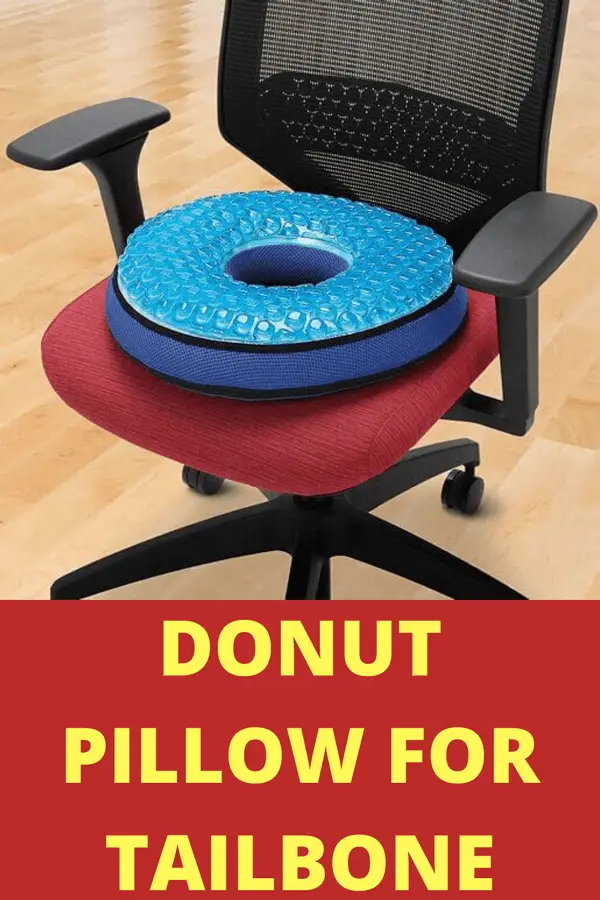Use this great donut-shaped seat pillow to effectively relieve pressure on the tailbone (coccyx).
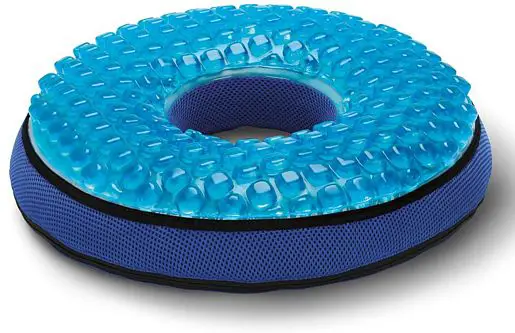
The ergonomic pillow also provides fantastic support.
The cut out cushion will keep your tailbone free from any direct pressure or contact.
Thanks to beaded gel nodules across the top of the pillow, your body weight will be evenly distributed.
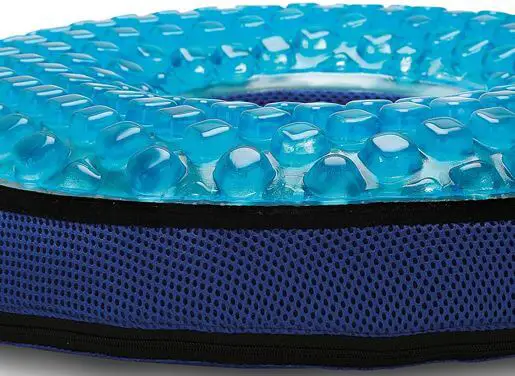
It is sculpted from high quality 3″-thick polyurethane foam. It immediately regains its original form when you rise.
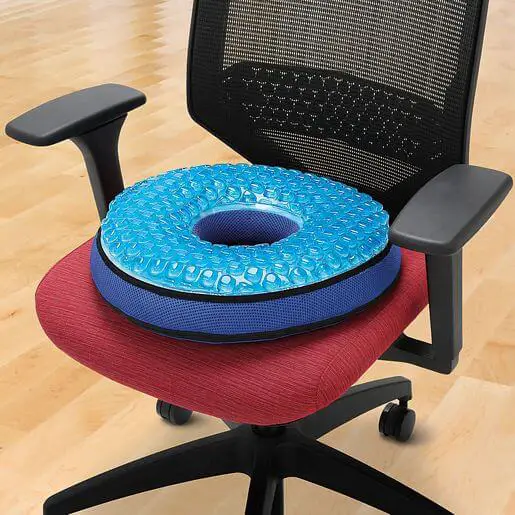
The donut pillow comes with a zippered cover that you can easily remove for hand washing.
Here is another great coccyx seat pillow.
It has a comfortable ergonomic design that provides pain relief from pressure on the tailbone and spine and promotes a straight, healthy posture.
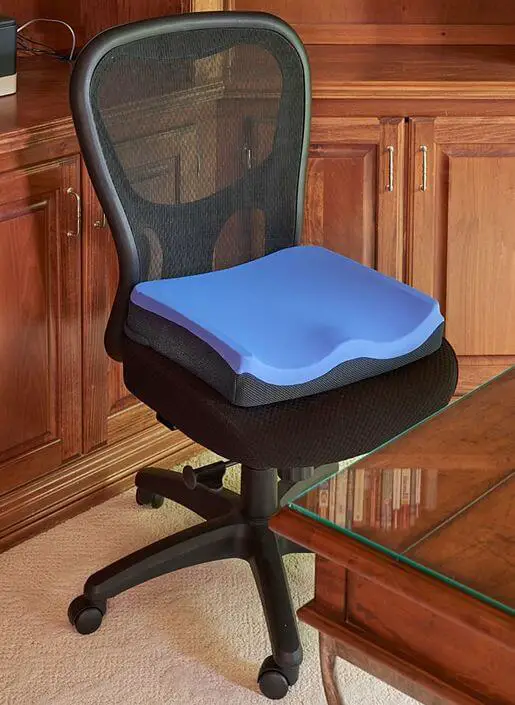
The pillow uses advanced technology to absorb up to 84% of the pressure put on the coccyx.
The slight abductor pommel lightly tips the hips forward, easing back pain and preventing damaging slouching.
The high-quality foam core is protected by a breathable mesh fabric.
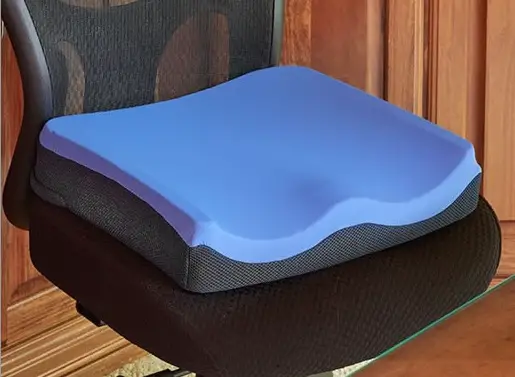
The cushion is cool to the touch and can decrease the body temperature by 2° F. The heat is also dissipated by air circulation holes.
The pillow has non-skid base to keep it from sliding or twisting in the chair.
Enhance comfort and stop tailbone pain during long hours of sitting using one of these two coccyx seat cushions.
Self treatments
Here are top 5 self treatments for tailbone pain, which is your coccyx, also called coccydynia. Dynia means pain, pain in your tailbone.
This injury is fairly common. Let’s first talk about where the injury occurs.
So there is your low back and right below it is the sacrum and then right below that is the little coccyx bone.
Normally when you sit down, the coccyx does move forward just a little bit. It actually acts a little bit as a shock absorber.
It’s not just hanging out in the air. It has muscles, ligaments and tendons. So this is well supported.
When you you get an injury, let’s say you fall on to your butt, one of the things that can happen is it can get fractured or it can get pushed forward. Or it can go out; that can happen in childbirth during labor. It can also go off to the side and it can also rotate. Or it could do a combination of any one of those.
A lot of times these tend to get better on their own, it may take a couple weeks or a month but if they don’t, it may be the muscles around them that are acting up and spasming on you. It can also be slow healer; it depends on how you treat it.
Self treatments you can do:
1. The first thing you do is you want to try to get it to calm down. So you’re going to try some ice just for a short period of time. Take the ice pack and sit on it.
You could also take a natural anti-inflammatory or ibuprofen. Hit it pretty hard for three days and see if that calms it down. During that period of time you do want to make sure you’re not putting pressure on that area. People find that it hurts when they’re sitting on it and it hurts more when you lean back. If you lean forward a little bit, it often takes the pressure off the area.
2. Two sitting solutions: one is to buy a donut cushion. The second is a regular pillow. You just fold a pillow in half and then you’re going to sit on it and you’re going to sit to the point where your coccyx is off the pillow.
You really want to avoid putting pressure on that area. All you’re doing is firing up the muscles there.
3. Try some heat. You can try a regular heating pad but what would work even better is using an infrared pad because it goes much deeper. Normal heating pads just go a couple millimeters. Infrared goes up to 60 millimeters, which is over two inches.
If you fell on your tailbone and it’s very sore, do not use heat until after a few days. That’s why the ice is first.
4. You could actually try a combination of the two. You are trying to calm those muscles down through contrast. You can do the heat and then you can do the ice. For example, sit on the heat for about 45 minutes and then you can throw the ice on for 20 minutes.
5. You’re going to want to try to eventually set up like a sitting schedule. You want to see when it starts to feel a little bit better. Start sitting and when it starts to hurt you get up.
Chair sitting skill
When you’re sitting in a chair, if the knees are together, it makes the top of the pelvis go back. It makes you slump. So knees together is the same as slumping.
If you do this with the knees and then you sit up straight, it’s putting stress on the low back and the hips. This is particularly for women. When the knees are apart, shoulder width or more, the pelvis can roll forward, give you a lumbar support and you can walk the sitting bones behind and you can sit without any tension in the back.
When you sit like this, your back should be pretty soft. All you have to do is put your hand on your own back and ask yourself how soft is it right along the spine. What do I feel? This is your index. If it’s hard, you know you have to learn more skills about chair sitting.
To sit functionally, walk the sitting bones behind, you need to have a chair the right height, the hard surface, the knees apart – shoulders over the hips, you need to do the work to correct the head forward posture. You need to have a little bit of vigilance when you sit not to bring the head forward.
So when it comes to chair sitting, you should burn in your memory these things:
knees apart, chair the right height, walk the sitting bones behind, the shoulders over the hips, don’t protrude the low ribs forward, don’t stiffen to sit up straight. It’s better to sit in the back rest or slump then to stiffen.
Sit-up stiff is insane unless you understand how to do it without tension: walk the sitting bones behind, the knees apart, sense the breathing in front, the sides and the back, the feet firmly planted under you, not too far in front not too far back, the pelvis rolled forward. Then you can sit in meditation posture.
I hope these tips will help you with your tailbone pain. I strongly recommend you buy coccyx donut seat cushion. For me, it’s the best solution.
